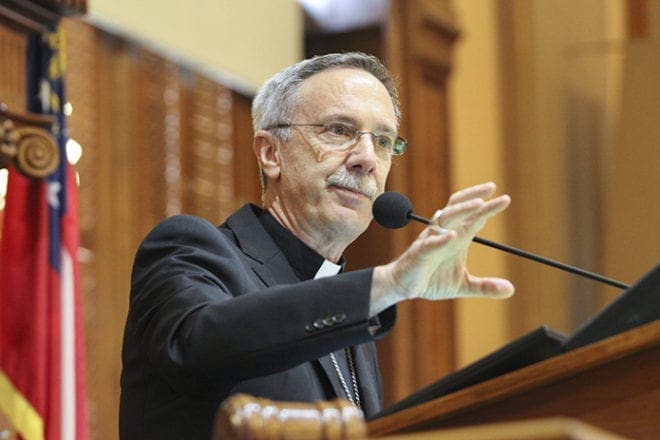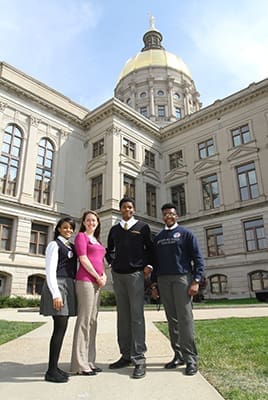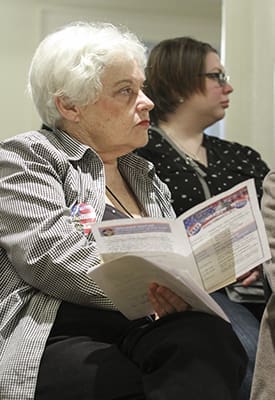Atlanta House District 81 Rep. Scott Holcomb, left, converses with Bishop Luis Zarama as the two stand inside the Georgia House of Representatives' chamber during the Feb. 21 Catholic Day at the Capitol. Holcomb is a member of Immaculate Heart of Mary Church, Atlanta. Photo By Michael Alexander
Atlanta
Catholics advocate for legislation on scholarships, sex trafficking, death penalty
By NICHOLE GOLDEN, Staff Writer | Published March 9, 2017 | En Español
ATLANTA—More than 75 Catholics took to the marble hallways of the state Capitol for a day of advocacy Feb. 21.
Catholic Day at the Capitol is an annual event of the Georgia Catholic Conference, the public policy arm of the dioceses of Atlanta and Savannah. The day promotes faith in action during the state’s legislative session. Catholics began with a morning briefing on key legislation at the adjacent Shrine of the Immaculate Conception.
Frank Mulcahy, executive director of the Georgia Catholic Conference, said lawmakers, when in chambers while the session is underway, are happy to be called out to meet with constituents, and that kind of contact is fruitful.
“They deal with a lot of issues every day,” said Mulcahy, so it’s critical that people advocate for legislation.
“What you’re doing is very important,” he said.

Bishop Luis Zarama addresses the House of Representatives at the Georgia Capitol, Feb. 21, before leading them in a prayer. In a challenge to the lawmakers Bishop Zarama said, “Become a true servant of the people who chose you. Never be afraid to open your hearts and serve your people.” Photo By Michael Alexander
Those attending included parish groups, priests and deacons of the Atlanta Archdiocese, students from Cristo Rey Atlanta Jesuit High School, and educators from the Diocese of Savannah, including Savannah Catholic school superintendent Michelle Kroll.
Bishop Luis R. Zarama, Atlanta auxiliary bishop, encouraged participants gathered in the Shrine’s basement.
“For Jesus, nothing was easy at all. We need to follow him in his footsteps,” he said.
On the way to the briefing, the bishop said he noticed how other would-be lobbyists dressed uniformly for their respective days of advocacy.
Youth representing Future Farmers of America donned blue jackets and members of the Home Builders Association of Georgia sported reflective vests for their legislative events. Pharmacy school students wore white lab coats to identify them to lawmakers.
Bishop Zarama urged attendees to show that Catholics are a joyful people.
“This is our faith. And love is the best way to approach things,” Bishop Zarama said. “We don’t have uniforms, but we have the best thing of all.”
Advocates should be messengers of the good news, noted the bishop.
“We ask for all of you to dress in love,” he said.
Spotlighted legislation
This session, the Georgia Catholic Conference has monitored the progress of three pieces of legislation:
HB 217 addresses tax credits for student scholarship organizations. Georgia allows tax credits for donations to student scholarship organizations, which provide assistance to students in non-public schools. GRACE Scholars, supporting Catholic schools in Georgia, is one such organization. Under current law, the statewide maximum in tax credits permitted for donations to all SSOs annually is $58 million. The bill proposes to increase the maximum to allow more donations and scholarships. HB 217 cleared the Georgia House of Representatives on Feb. 28 and moved to the Georgia Senate.
SB 185 would change the standard of proof of intellectual disability in capital punishment sentencing. Georgia is the only state using the most difficult standard of proof of “beyond a reasonable doubt.” This bill, referred to the Senate Judiciary Committee, changes the standard to “preponderance of the evidence.” It better protects people with intellectual disabilities from wrongful execution. On March 1, Sub-Committee B of the Senate Judiciary Committee held a hearing on the bill that was well attended. This was a non-voting hearing. As a result the legislation did not receive a vote in time for this session, but proponents are optimistic about the bill’s passage during the 2018 session.
SB 39 and HB 341 including listing on the sex offender registry of those convicted of pimping or pandering. Sponsors are Sen. Renee Unterman, R-45th District, and Rep. Bert Reeves, R-Marietta. HB 341 was approved by the House, sent to the Senate and referred to the Judiciary Committee.
The session, which began Jan. 9, is scheduled to conclude near the end of March.
Maggie Rousseau, director of the Disabilities Ministry for the archdiocese, urged support of the intellectual disabilities standard of proof bill, SB 185. It would bring Georgia in line with other states in assessing whether a person has an intellectual disability that makes them ineligible for capital punishment.
“Why is this bill important? This is just wrong,” said Rousseau of Georgia’s distinction as the state with the highest standard for an individual in the sentencing phase to prove an intellectual disability.
“Lean towards mercy,” she said. “We are not savages in the state of Georgia. We are really good and decent people. I know we can make this happen.”
Kat Doyle, director of the archdiocesan Justice and Peace Ministries, presented an overview of the problem of sex trafficking in metro Atlanta. Doyle said hundreds of people, including children, are being trafficked nightly in the area.
Last year, voters approved an amendment to the state constitution to provide a fund for rehabilitation of minors who were victims of trafficking.
Doyle said this year’s proposed legislation addresses another aspect of the problem.
“This year is about demand,” she emphasized.
Doyle encouraged advocates to tell lawmakers to push the bills through and “vote yes.”
High school students participate
Matt and Michelle Dukes of Snellville, parishioners of St. Stephen the Martyr Church in Lilburn, were participating in Catholic Day for the first time. He will enter the Catholic Church this Easter.
It’s important “to be involved and do more and show him there’s more to being Catholic then just going to church,” said Michelle Dukes.
The couple moved to metro Atlanta from south Georgia two years ago and planned on speaking to their representative about pro-life issues.

Cristo Rey Atlanta Jesuit High School religion instructor and campus minister Bernadette O’Neill, second from left, accompanied Cristo Rey Atlanta students (l-r) Monica Epps, Malcolm Delfish and Jahari Fraser to the 2017 Catholic Day at the Capitol. Photo By Michael Alexander
Jahari Fraser, 16, was one of a trio of Cristo Rey students taking part in the event. Fraser said they were encouraged to speak to their lawmakers in person. As president of the campus ministry team, he was interested in speaking out against the death penalty.
“I don’t think that’s the right mindset. If God forgives, why can’t we forgive,” said Fraser.
Fraser attends a non-denominational church and believes it important to participate in campus ministry and various activities outside of classes.
“I didn’t want to be just any regular kid,” said Fraser, a junior.
He said although the death penalty has been in place for years, that doesn’t make it right. Fraser encourages others to know the backstories of inmates.
“I think I can make change with the campus ministry team,” he said.
Deacon Francis Head of St. Gabriel Church in Fayetteville navigated the historic Capitol in his wheelchair to represent those with disabilities. He brought his son, Will, for the first time. Will, adopted from Guatemala, was a voice for the Hispanic community.
“I’m just hoping for a visible presence,” said Deacon Head.
The deacon and a group of advocates spoke briefly to his senator in support of increased penalties for sex trafficking and on the proposed intellectual disability measure.
“We’re not saying punishment is not due,” the deacon said about the death penalty sentencing standard measure. “We’re looking for justice across the board.”
Jewish, Catholic faiths collaborate
Catholic Day enjoyed support from the Jewish community. Harold Hershberg, assistant regional director for the American Jewish Committee Atlanta, attended to offer encouragement. He said the collaboration is part of an “ongoing relationship with the Archdiocese of Atlanta.”
The AJC is focused on how to work with and be friendly with neighbors.
“Some of the issues are so in step with the Jewish community as well,” noted Hershberg of the areas of interest to Catholics.
“We look to see where we can strengthen our communities,” he said.
The AJC works to combat anti-Semitism and promote democratic values around the world.
Working with other faiths helps the AJC find the synergy to accomplish impactful goals.
“I am so blessed that we have this relationship,” said Hershberg about collaborating with the Catholic Church.

Nikki Vandergrinten, foreground, of Immaculate Heart of Mary Church, Atlanta, and Michelle Dukes, background, of St. Stephen the Martyr Church, Lilburn, participate in the legislative briefing for the Feb. 21 Catholic Day at the Capitol. Photo By Michael Alexander
Bishop Zarama served as chaplain of the day for the Georgia House, providing remarks before praying with representatives. Catholic Day participants took seats in the gallery above chambers for a bird’s eye view.
“I am scared to death to be here in front of you,” he admitted to lawmakers.
The bishop said he changed his mind about speaking from prepared notes and decided instead to speak from his heart.
Bishop Zarama told representatives he appreciated their call to serve.
“You are here because the people entrust and trust you. They trust you to be here. You have a mission to fulfill,” he said.
The bishop acknowledged that service is not easy.
“Why? Because to be able to serve the people, you need to know the hearts of the people,” he said.
Lawmakers bring the agenda of the people to the Capitol, and the public is looking to them and expecting a lot from them.
“Let your hearts be free to listen. Let your hearts be free to talk. Let your hearts be open to share, and let yourselves reach each other,” said Bishop Zarama.
Joy will come from fulfilling the obligation of service and having agendas of justice versus personal agendas, he said.
Before leading the Pledge of Allegiance, Bishop Zarama offered a prayer for the families and staff members of lawmakers, and the representatives themselves.
“Give them the hearts and minds to protect the lives, liberty and the human desires for happiness with which you have endowed us,” he prayed.